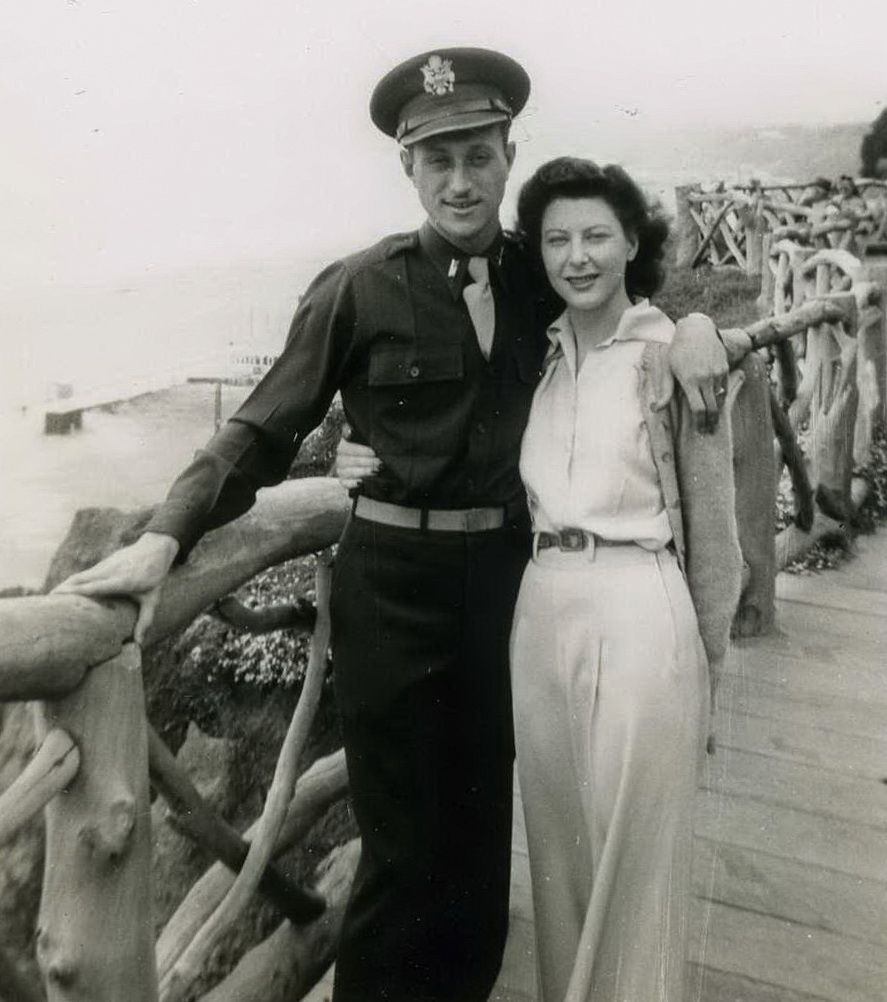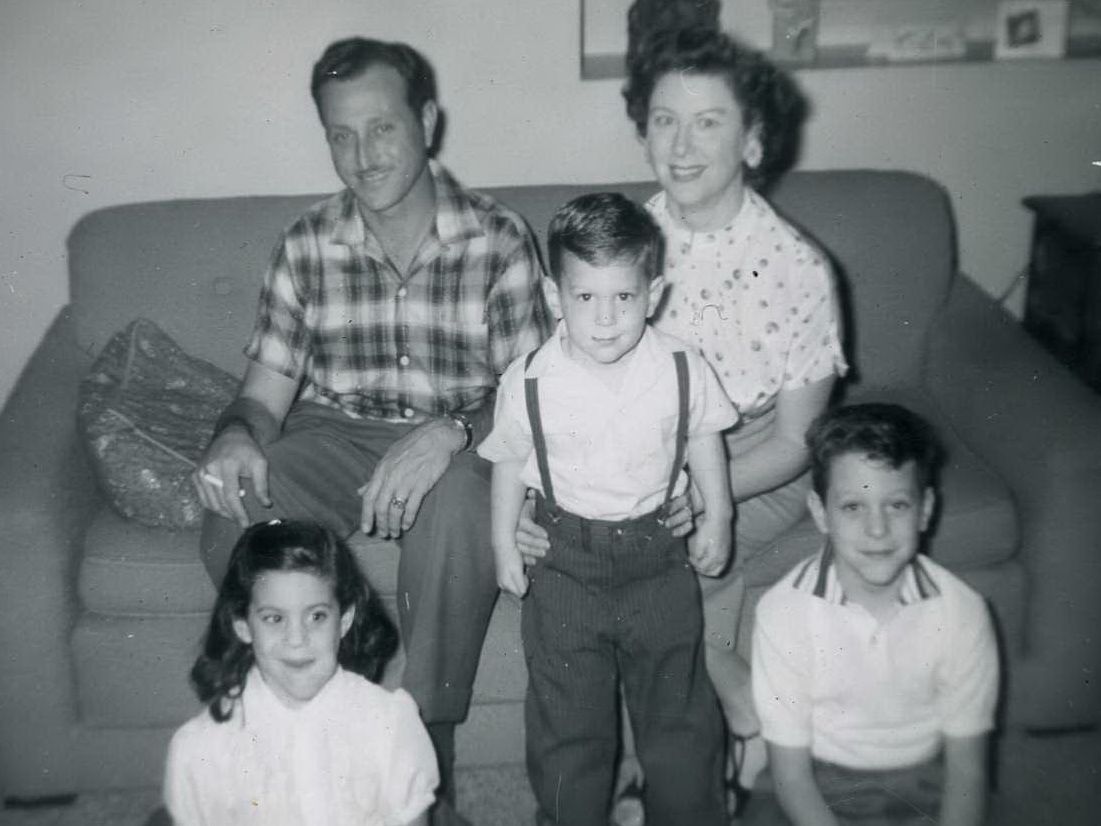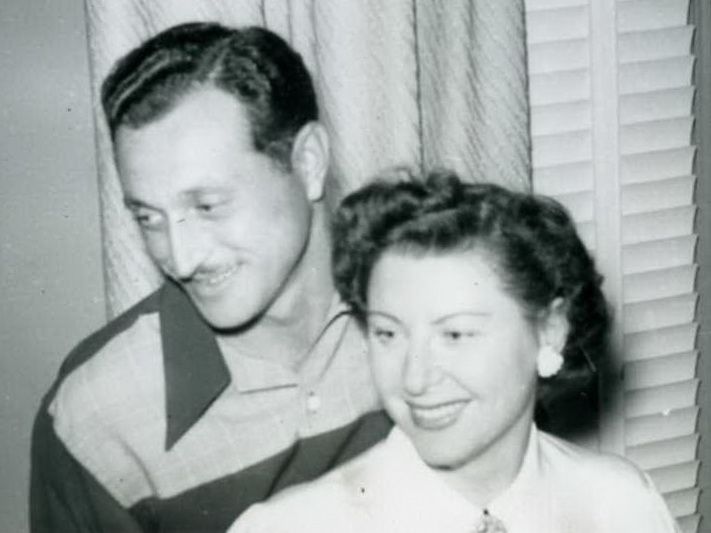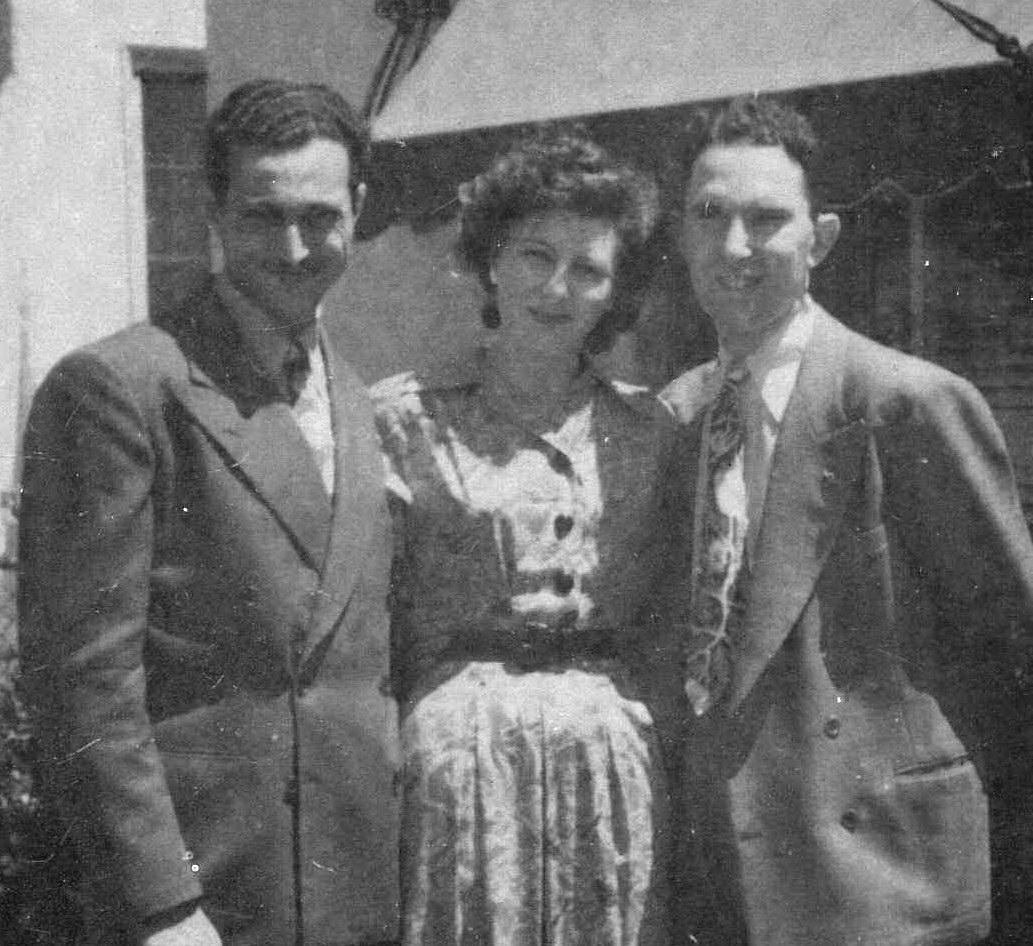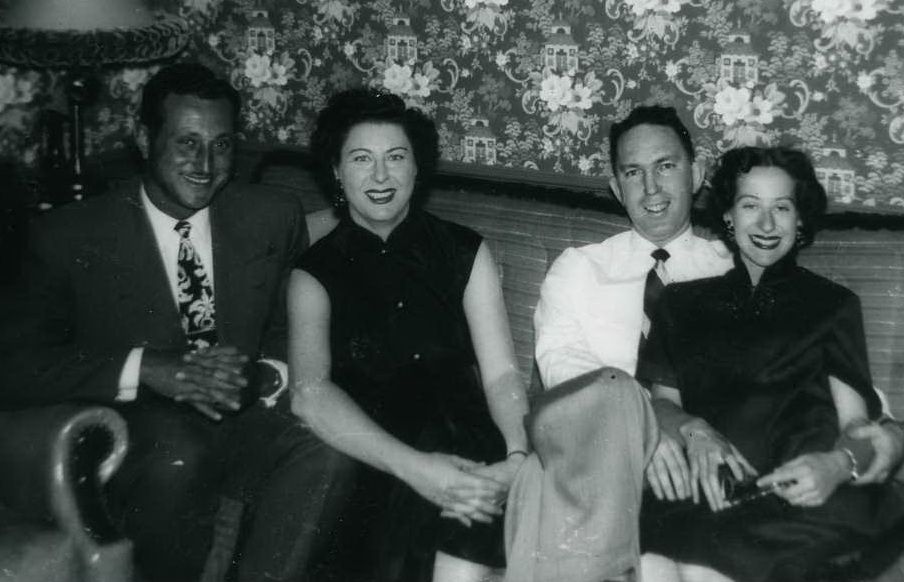Louis Sanders, nicknamed Lou, Yiddish name Leibl, was born in Chicago on Sunday, September 21, 1919, perhaps at Michel Reese Hospital. He was the first of five children born to Julius (Zindl) Sanders (Senderovich) (9/19/1891 – 3/29/1969) and Beckie (Rivka) Desendorf (10/5/1895 – 4/11/1981). Julius emigrated from Bratslav (Ukraine) in 1912 and was naturalized in 1927. He was a tailor by trade and worked for his eldest brother Isadore. Beckie followed her sister from Lvov (then Poland now Ukraine) and was a homemaker.
Lou was the eldest of 5 children (Irving, Bernard, Marion, Barbara). He spoke only Yiddish until age 5. He was raised amidst his extended family in an all-immigrant neighborhood on Washtenaw Avenue, off Division Street in the Humboldt Park area northwest of downtown. Manya (aka Marion), Beckie's sister, died while Lou was a kid, so his cousins came to live with them. In his youth he was a member of Deborah Boys Club where he became forever friends with Cook, Husky, Ben, and Buddy. During his early years, anti-Semitism was rampant in Chicago (and elsewhere), so he learned to hide his Jewishness. When he had his own family, he would attend High Holy Day services and Bar Mitzvahs but did not attend temple on any kind of regular basis. His family always had a "Hanukkah Bush" in its early years. When he and I traveled to Europe in 1971, and I wore my watch with Hebrew letters, he asked me to take it off while we were in Germany.
He was fond of telling the story that as a child his father would give him a nickel to purchase a bucket of beer from a nearby tavern. He would walk across the street, slide the nickel under the door, and the bucket would be returned in the same manner. One fine day, as he was returning home with the full bucket, a car careened around the corner and fired machine gun bullets into the tavern. Lou was startled and fell, spilling the contents of the bucket into the street. Returning home with the empty bucket, his father's only concern was that there was no beer and no nickel.
Being an adventurous teenager, he and his pals snuck into morgue in 1934 to see the bullet-riddled body of notorious gangster John Dillinger. In order to help his family make ends meet during the Great Depression, Lou began working for his cousin Ben who was a surveyor. This would ultimately become Lou's career. He and his friends drove from Chicago to Washington DC in 1939 to visit the World's Fair.
Lou's world changed when World War II began. To avoid the draft Lou joined the army's Officer's Candidate School in 1942, graduating as a 2nd lieutenant, eventually getting promoted to first. While at a USO dance in San Diego, he met Barbara (Bobbie) Myerson, marrying her on May 2, 1943 in Los Angeles. They traveled the country as he was assigned to several army camps (California, Texas, Georgia) before shipping off to Europe in 1944. Lou was stationed in England prior to and after D-day, but was shipped to Belgium late in 1944, during Battle of the Bulge. While he didn't see direct combat, his unit was assigned a horrifying task.
During the battle, the Germans had captured several units of Americans. To put fear in the hearts of American GIs and their leaders the Nazi policy was to murder their prisoners, which they did on the outskirts of the village of Malmedy. Lou's unit was one of several assigned to find and repatriate the bodies of the dead soldiers. This had a lifelong impact on Lou.
He told me a story about the battle. He and his unit had found a barn in a town called Faymonville to sleep in one night during the battle. The next morning, he looked out the window to see the German army pushing through. Needless to say, they were terrified, and made the decision to remain v-e-r-y quiet. The next morning, they were pleased to see the Americans moving through.
Lou received a shrapnel wound in his leg, though I don't know how he got it. Worse, however, was that his feet froze (this was the coldest winter in Europe in a very long time), so he was shipped back to England to recover before he could go with his unit into Germany. His feet were saved from amputation, but the doctors told him if they froze again, he would lose them, which meant he couldn't live in Chicago with Bobbie after the war as he had planned. He received a Purple Heart and, like most soldiers who fought in Europe, was awarded the Bronze Star. After the war ended, but before he returned home, he helped to resettle refugees, until his discharge in 1946.
After mustering out of the Army, he returned to the USA, and he and Bobbie lived with her parents in Hollywood, California. They bought a house on Tuller Avenue in Culver City, a growing suburb of Los Angeles in 1947, and raised a family with two sons and a daughter.
Lou worked for a while in sales for a local upholstery company, before joining the Operating Engineers union as surveyor. He worked for the union for many years until the early 1960s, when he and his partner Cliff Ring opened their own surveying office, Ring & Sanders Land Surveyors. Lou hand-painted the company's name on the side of our station wagon. His life working outside created amusing photos of the family that show a very tan Lou standing with a very pale Bobbie. He sold his share of the business to Cliff and Don Ellzey in the late 60s and found employment with other companies in the next few years working both out "in the field" and as a draughtsman.
Lou suffered from bipolar disorder, which was then called manic depressive disorder. He was hospitalized several times in his 40s-50s and was treated with electro-convulsive therapy, then known as shock treatment. Despite everyone's best efforts Lou and Bobbie divorced in 1968.
Lou moved into his parents' tiny one-bedroom apartment shortly after the divorce. His father had been exhibiting signs of dementia, and he could provide help to his parents. However, only months later his father died in his arms. He stayed with his mother until she relocated into an apartment of her own. She lived there until the family placed her into a senior living environment. Lou remained in that same apartment until his own death on May 4, 1981.
Lou possessed a very dry sense of humor that would take you by surprise. In his last few years, he worked in a surveying office as a draughtsman. He was an excellent artist, admired by his nieces for his drawings of horses. His lettering on maps looked like it was created by a machine in its precision and clarity.
Louis Sanders, nicknamed Lou, Yiddish name Leibl, was born in Chicago on Sunday, September 21, 1919, perhaps at Michel Reese Hospital. He was the first of five children born to Julius (Zindl) Sanders (Senderovich) (9/19/1891 – 3/29/1969) and Beckie (Rivka) Desendorf (10/5/1895 – 4/11/1981). Julius emigrated from Bratslav (Ukraine) in 1912 and was naturalized in 1927. He was a tailor by trade and worked for his eldest brother Isadore. Beckie followed her sister from Lvov (then Poland now Ukraine) and was a homemaker.
Lou was the eldest of 5 children (Irving, Bernard, Marion, Barbara). He spoke only Yiddish until age 5. He was raised amidst his extended family in an all-immigrant neighborhood on Washtenaw Avenue, off Division Street in the Humboldt Park area northwest of downtown. Manya (aka Marion), Beckie's sister, died while Lou was a kid, so his cousins came to live with them. In his youth he was a member of Deborah Boys Club where he became forever friends with Cook, Husky, Ben, and Buddy. During his early years, anti-Semitism was rampant in Chicago (and elsewhere), so he learned to hide his Jewishness. When he had his own family, he would attend High Holy Day services and Bar Mitzvahs but did not attend temple on any kind of regular basis. His family always had a "Hanukkah Bush" in its early years. When he and I traveled to Europe in 1971, and I wore my watch with Hebrew letters, he asked me to take it off while we were in Germany.
He was fond of telling the story that as a child his father would give him a nickel to purchase a bucket of beer from a nearby tavern. He would walk across the street, slide the nickel under the door, and the bucket would be returned in the same manner. One fine day, as he was returning home with the full bucket, a car careened around the corner and fired machine gun bullets into the tavern. Lou was startled and fell, spilling the contents of the bucket into the street. Returning home with the empty bucket, his father's only concern was that there was no beer and no nickel.
Being an adventurous teenager, he and his pals snuck into morgue in 1934 to see the bullet-riddled body of notorious gangster John Dillinger. In order to help his family make ends meet during the Great Depression, Lou began working for his cousin Ben who was a surveyor. This would ultimately become Lou's career. He and his friends drove from Chicago to Washington DC in 1939 to visit the World's Fair.
Lou's world changed when World War II began. To avoid the draft Lou joined the army's Officer's Candidate School in 1942, graduating as a 2nd lieutenant, eventually getting promoted to first. While at a USO dance in San Diego, he met Barbara (Bobbie) Myerson, marrying her on May 2, 1943 in Los Angeles. They traveled the country as he was assigned to several army camps (California, Texas, Georgia) before shipping off to Europe in 1944. Lou was stationed in England prior to and after D-day, but was shipped to Belgium late in 1944, during Battle of the Bulge. While he didn't see direct combat, his unit was assigned a horrifying task.
During the battle, the Germans had captured several units of Americans. To put fear in the hearts of American GIs and their leaders the Nazi policy was to murder their prisoners, which they did on the outskirts of the village of Malmedy. Lou's unit was one of several assigned to find and repatriate the bodies of the dead soldiers. This had a lifelong impact on Lou.
He told me a story about the battle. He and his unit had found a barn in a town called Faymonville to sleep in one night during the battle. The next morning, he looked out the window to see the German army pushing through. Needless to say, they were terrified, and made the decision to remain v-e-r-y quiet. The next morning, they were pleased to see the Americans moving through.
Lou received a shrapnel wound in his leg, though I don't know how he got it. Worse, however, was that his feet froze (this was the coldest winter in Europe in a very long time), so he was shipped back to England to recover before he could go with his unit into Germany. His feet were saved from amputation, but the doctors told him if they froze again, he would lose them, which meant he couldn't live in Chicago with Bobbie after the war as he had planned. He received a Purple Heart and, like most soldiers who fought in Europe, was awarded the Bronze Star. After the war ended, but before he returned home, he helped to resettle refugees, until his discharge in 1946.
After mustering out of the Army, he returned to the USA, and he and Bobbie lived with her parents in Hollywood, California. They bought a house on Tuller Avenue in Culver City, a growing suburb of Los Angeles in 1947, and raised a family with two sons and a daughter.
Lou worked for a while in sales for a local upholstery company, before joining the Operating Engineers union as surveyor. He worked for the union for many years until the early 1960s, when he and his partner Cliff Ring opened their own surveying office, Ring & Sanders Land Surveyors. Lou hand-painted the company's name on the side of our station wagon. His life working outside created amusing photos of the family that show a very tan Lou standing with a very pale Bobbie. He sold his share of the business to Cliff and Don Ellzey in the late 60s and found employment with other companies in the next few years working both out "in the field" and as a draughtsman.
Lou suffered from bipolar disorder, which was then called manic depressive disorder. He was hospitalized several times in his 40s-50s and was treated with electro-convulsive therapy, then known as shock treatment. Despite everyone's best efforts Lou and Bobbie divorced in 1968.
Lou moved into his parents' tiny one-bedroom apartment shortly after the divorce. His father had been exhibiting signs of dementia, and he could provide help to his parents. However, only months later his father died in his arms. He stayed with his mother until she relocated into an apartment of her own. She lived there until the family placed her into a senior living environment. Lou remained in that same apartment until his own death on May 4, 1981.
Lou possessed a very dry sense of humor that would take you by surprise. In his last few years, he worked in a surveying office as a draughtsman. He was an excellent artist, admired by his nieces for his drawings of horses. His lettering on maps looked like it was created by a machine in its precision and clarity.














